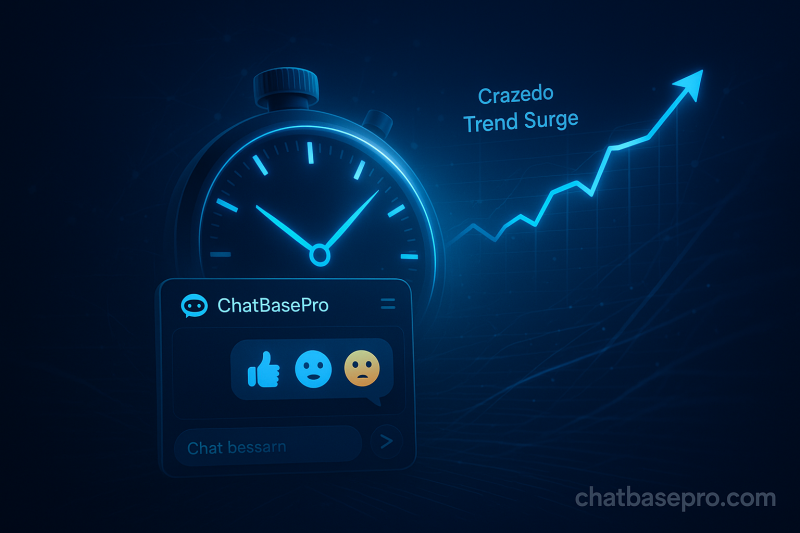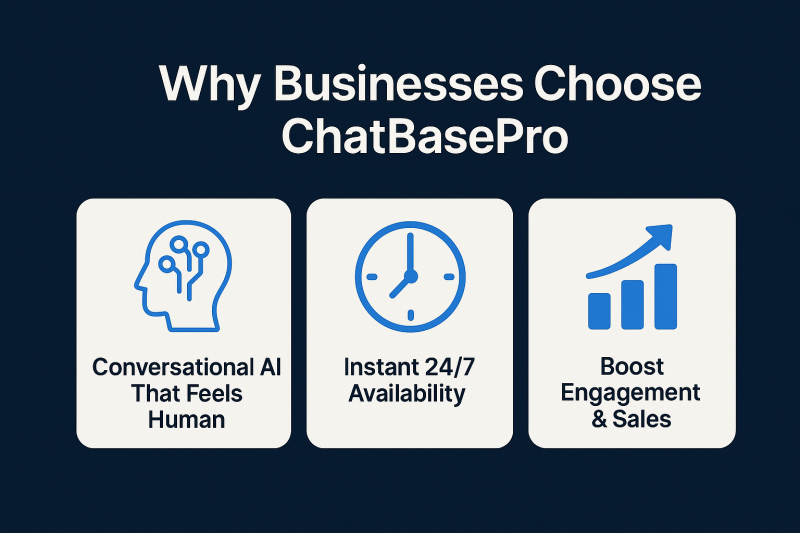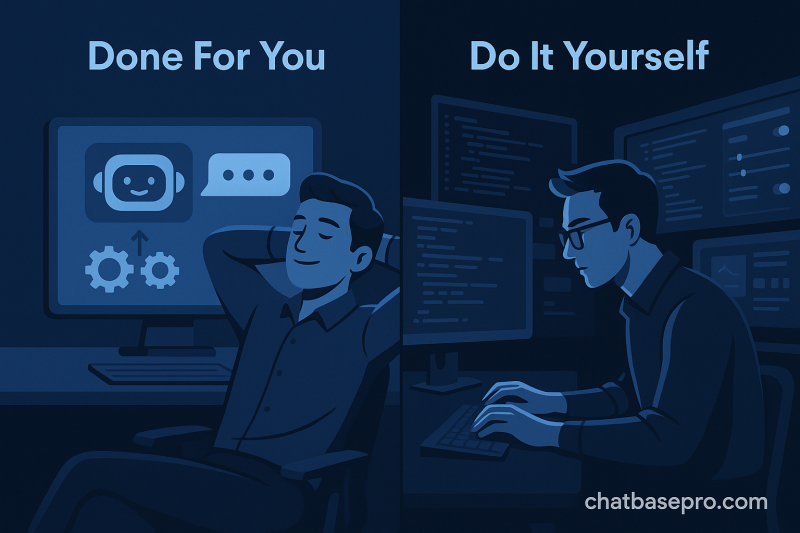In 2025, the competition for online customers is more intense than ever. Every website, regardless of industry, is fighting for the same thing: attention, trust, and conversion. Within this environment, businesses must decide whether human support or AI chatbots deliver better results for sales, customer engagement, and long-term growth. This question has grown beyond customer service. It now sits at the heart of business strategy. Buyers move faster, expect more, and have less patience. If a website takes too long to respond, customers disappear instantly. If information is unclear, they hesitate. If a checkout step is confusing, they abandon the cart.
This is where the performance gap between AI and human support begins to show itself. 2025 has become the turning point. AI chatbots are no longer basic automated responders. They are advanced business agents powered by reasoning, memory, multilingual capabilities, and personalized interaction. At the same time, human agents still play a critical role, especially for complex or emotional scenarios. The key is not simply deciding between AI and humans. The real question is: Which one actually generates more revenue, and under what conditions? This article breaks down the core differences in a streamlined format with fewer sections, but deeper content.
Speed, Response Time, and the New Customer Standard
Speed is the first factor that shapes conversion. When customers have questions about pricing, product options, shipping rules, or booking instructions, they want answers right away. No delay, no queue, and no back-and-forth emails. AI chatbots in 2025 respond in under a second. They don’t wait, they don’t slow down during peak hours, and they can handle unlimited sessions at once. A customer in Norway, another in the U.S., and another in the Middle East can ask questions at the same moment and all receive perfect, instant answers. This type of availability directly increases sales because hesitation disappears.
The user stays on the page, stays engaged, and continues toward the next step. Human support cannot match this structure. Even the fastest teams need several minutes during busy hours. When hundreds or thousands of customers enter a website every day, no human team can match AI’s ability to maintain instant engagement. This difference alone results in a measurable sales increase for businesses using AI support systems. Speed is not just convenience. It is revenue protection. The faster the answer, the stronger the conversion path.
Accuracy, Consistency, and Trust
Beyond speed, accuracy decides whether the user trusts the answer and moves forward. Modern AI agents like those powered by ChatBasePro deliver consistent information every time. They remember product details, pricing rules, policies, and website-specific instructions. They don’t make mistakes due to stress or oversight, and they don’t forget updates. Humans, even highly skilled, vary from day to day. An agent might give a slightly different answer from another agent or miscommunicate a small detail that affects the customer’s decision.
These variations accumulate and affect trust, especially when users talk to a team over weeks or months. AI maintains a stable level of clarity. When the data is correct, the answer is correct. And consistency builds trust — a key driver of sales, especially in industries where buyers compare many options. However, humans have strengths AI cannot fully replace. They can detect emotion, understand frustration, calm a difficult situation, or handle rare cases that fall outside normal patterns. These moments are powerful for customer loyalty, especially for high-ticket or relationship-driven businesses. Still, for general sales support, product questions, and pre-purchase hesitation, AI consistently outperforms in 2025 due to accuracy and reliability.
Conversion Patterns and Buyer Intent
This is the part most businesses underestimate: AI chatbots do not only answer questions — they guide behavior.
Modern AI agents detect patterns in real time:
a user scrolling pricing pages
someone returning to the same product multiple times
a customer hesitating during checkout
someone comparing two service plans
a visitor reading shipping terms for too long
a buyer stuck on a technical step
The AI responds instantly in the right moment.
It might offer clarification, a discount code, a comparison table, a link to the correct FAQ, or a guided step to complete the purchase or booking. Human agents cannot see these micro-signals. They only respond when a user decides to start the conversation. By the time they ask for help, the opportunity may have already weakened. This is why AI-powered sales assistance generates significantly higher conversions. It operates by analyzing user behavior, not waiting for contact.
This ability turns silent hesitation into active engagement. Industry studies show that AI-driven support increases conversion rates by 17–38%, depending on the website type, traffic volume, and complexity of the offer. Human-only support typically converts at a much lower rate because half of the sales opportunities never become conversations. AI captures the invisible sales — the ones that would have been lost without intervention.
Cost Efficiency vs Revenue Expansion
Cost is not the only consideration, but it shapes long-term strategy. Maintaining a human support team requires salaries, training, scheduling, management, HR, and continuous oversight. Even a small support operation costs thousands every month. As the number of customers grows, staffing must grow with it. AI works on the opposite model. One properly configured chatbot can manage hundreds or thousands of interactions simultaneously without increasing expenses. This means the more traffic a business receives, the more profitable AI becomes. Scaling AI is nearly free. Scaling humans is extremely expensive.
The cost-to-performance ratio is one of the main reasons small businesses in 2025 choose AI-first support models. The return on investment is simple: less cost, more conversions, more coverage. But this does not eliminate the value of human agents. For specialized cases, emotional moments, or high-ticket conversations, humans provide depth and nuance AI cannot replicate. This is why many successful businesses now combine both approaches.
The New Standard: AI-First, Human-Enhanced
The most effective websites in 2025 follow a new structure:
AI handles instant questions
AI manages navigation and guidance
AI captures leads
AI recovers abandoned carts
AI filters support requests
Humans step in for complex issues only
Humans solve emotional or unique cases
Humans close bigger deals with personal touch
The combination produces the highest sales numbers because every type of customer receives the right form of support. AI eliminates silence, waiting, confusion, and repeated questions. Humans solve problems that require deeper communication. Together they form the strongest model for ecommerce stores, service providers, agencies, SaaS platforms, and booking-based businesses. This hybrid structure is exactly why ChatBasePro exists — to give small businesses enterprise-level automation without enterprise-level cost. It allows entrepreneurs to operate 24/7 with speed, accuracy, and conversion logic that previously only large companies could afford.
Conclusion: Who Produces More Sales in 2025?
If we look at pure numbers, AI chatbots generate more total sales because they:
respond instantly
remove friction
detect buyer intent
guide customers automatically
recover lost opportunities
support visitors 24/7
never miss a question
Human agents, however, remain essential for the final 5–15% of interactions that require trust, empathy, personalization, or complexity. The future is not AI replacing humans. The future is AI doing everything humans shouldn’t be doing so humans can focus on where they truly excel. Businesses that adopt this model outperform competitors in traffic conversion, customer satisfaction, and cost efficiency. If your website wants to operate at 2025 standards, an AI-first, human-enhanced support system is no longer optional — it is the new baseline for growth.
FAQ: AI Chatbots vs Human Support in 2025
1. Do AI chatbots actually increase sales in 2025?
Yes. AI chatbots increase sales by responding instantly, removing hesitation, guiding users through checkout, and capturing leads at any hour. When customers receive support without waiting, they remain engaged and are more likely to complete a purchase or booking. Across ecommerce, SaaS, and service websites, AI chatbots typically generate 17–38% higher conversions compared to human-only support teams.
2. Can AI chatbots fully replace human support teams?
Not fully. AI chatbots can replace repetitive, simple, and pre-purchase questions, but humans are still essential for escalations, emotional cases, custom solutions, and high-ticket sales conversations. The most effective model in 2025 is AI-first with human enhancement. This allows businesses to reduce workload while improving quality.
3. Are customers comfortable talking to AI instead of humans?
More than ever. Customer behavior in 2025 shows that most users prefer fast, accurate answers over waiting for a human reply. As long as the AI is well-trained and gives clear responses, customers have no issue completing purchases, asking questions, or receiving support from AI agents. For emotional or sensitive matters, customers still trust human support.
4. Do AI chatbots give more accurate answers than humans?
In most cases, yes. AI chatbots provide consistent information 100% of the time because they rely on trained data, company knowledge, and updated logic. Human agents are more prone to error due to fatigue, stress, miscommunication, or misunderstanding. AI ensures every customer receives the same correct, brand-approved information.
5. What type of businesses benefit the most from AI chatbots?
AI chatbots benefit all business types, but they are especially impactful for:
Ecommerce stores
Service providers
Agencies
SaaS platforms
Booking businesses
Local businesses
Freelancers and consultants
Any business with repetitive questions or high visitor volume gains immediate value from AI automation.
6. How do AI chatbots detect buyer intent?
Modern AI systems observe user behavior in real time: pages viewed, time spent on pricing, cart actions, comparison steps, scroll patterns, and hesitation signals. The AI then responds with the right message at the right moment. It might show a discount, provide product recommendations, or offer guided help. This behavior-based detection is something human agents cannot replicate.
7. Is an AI chatbot expensive to run?
No. AI chatbots in 2025 are significantly more affordable than human support teams. A full-time support agent can cost thousands of dollars per month, while an AI agent usually costs a small recurring fee. AI does not require training, management, shifts, or HR resources. It is the most cost-efficient support solution available today.
8. Can AI chatbots handle multiple languages?
Yes. Advanced chatbot platforms such as ChatBasePro provide multilingual support, often covering English, Norwegian, Arabic, and many more languages automatically. This allows businesses to communicate with global audiences without hiring additional staff or translators.
9. Do AI chatbots work for high-ticket sales?
Partially. AI chatbots are excellent at qualifying leads, answering initial questions, explaining features, and guiding users toward booking a call or demo. However, the final closing of a high-ticket sale is usually performed by a human because it requires negotiation, emotional understanding, and personal connection. AI increases opportunities, and humans close them.
10. How do AI chatbots handle complex questions?
Modern AI agents use reasoning, context understanding, and company-specific training data. They can interpret complex questions, retrieve information, and give structured answers. If a request needs human attention, the AI can automatically escalate the conversation to the appropriate person or department.
11. Will using AI chatbots hurt my brand reputation?
No. If configured correctly, AI improves reputation by offering faster service, accurate information, and 24/7 availability. Customers associate responsiveness with professionalism. As long as the chatbot matches your brand tone and provides value, it enhances credibility rather than hurting it.
12. Do AI chatbots integrate with existing websites easily?
Most modern chatbots, including ChatBasePro, integrate in minutes using a small code snippet. They work on WordPress, Shopify, Wix, custom websites, ecommerce platforms, landing pages, and almost any front-end system. No technical experience is required.
13. What happens if the chatbot gives an incorrect answer?
AI systems can be retrained, corrected, and improved instantly. Unlike human agents who require time-consuming training, updating an AI system is fast. ChatBasePro allows businesses to refine responses, update knowledge, and improve accuracy continuously.
14. How does AI compare to human response time?
AI responds in 0.3 seconds on average. Humans respond in minutes or hours depending on workload. Since customer patience is extremely low in 2025, response speed often decides who wins the sale. AI wins this category every single time.
15. Is AI support better for small businesses or large ones?
Both benefit significantly, but small businesses gain the most. AI automation levels the playing field by giving small businesses enterprise-grade support without enterprise costs. This allows them to compete with larger companies while reducing operational stress.
16. Does using AI reduce the need for customer support staff?
Yes, but it does not eliminate them entirely. AI reduces repetitive workload by 70–90%, allowing human agents to focus on complex tasks, escalations, and high-value interactions. Businesses often save money while improving support quality.
17. Can AI chatbots help with lead generation?
Yes. AI can collect emails, qualify users, ask pre-sales questions, guide visitors to booking pages, send follow-up messages, and deliver personalized recommendations based on user behavior. This makes AI a powerful tool for growing your leads and sales pipeline.
18. How reliable are AI chatbots during peak traffic?
AI performance does not change with traffic volume. Whether 10 or 5,000 visitors start chats at the same time, AI responds instantly without slowing down. Human teams cannot scale like this without hiring more staff.
19. Are AI chatbots safe for handling customer information?
Yes, modern systems follow strict data security standards. Platforms like ChatBasePro use encrypted communication, data protection rules, and limited access controls to keep information secure. AI can handle basic information collection safely when configured properly.
20. What is the biggest advantage of AI chatbots in 2025?
Their ability to combine speed, accuracy, and 24/7 availability to produce more conversions. They do not get tired, they never miss a question, and they identify buyer intent in ways human teams cannot. This makes AI the strongest sales assistant for modern websites.











Add comment
Comments